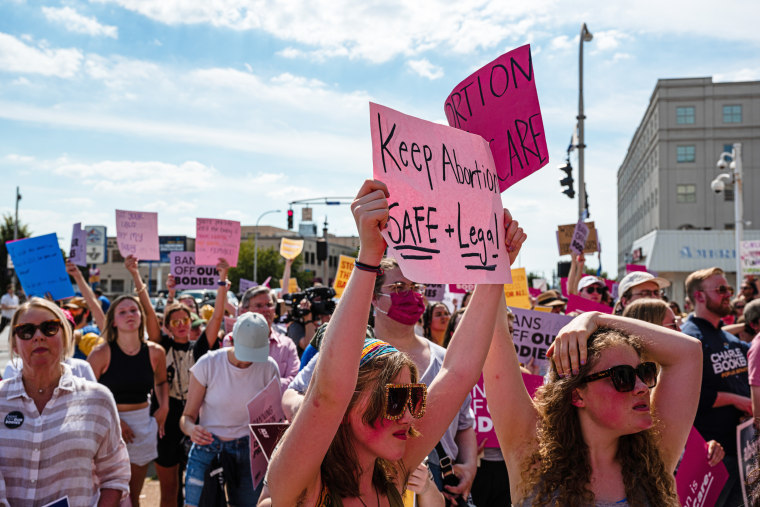A judge approved a temporary restraining order Thursday that blocks two laws banning abortion in Kentucky, marking yet another legal battle as abortion rights advocates challenge bans state-by-state.
The Supreme Court decision to overturn Roe v. Wade on Friday paved the way for two different so-called trigger laws in Kentucky — one which bans abortion outright passed in 2019 and another that outlaws abortion after a fetal heartbeat is detected. The 2019 law also makes it a class D felony to provide abortions to patients in the state.
The ruling comes after judges have issued temporary halts on abortion bans in Texas, Utah and Louisiana this week.
A suit brought forth by Planned Parenthood and EMW Women’s Surgical Center argues that the laws violate the Kentucky constitution’s rights to self-determination and privacy of bodily integrity.

“An individual who is required by the government to remain pregnant against her will — a significant physiological process affecting one’s health for 40 weeks and culminating in childbirth — experiences interference of the highest order with her right to possess and control her own person,” the lawsuit stated.
“The right to self-determination thus protects Kentuckians’ power to control whether to continue or terminate their own pregnancy,” it continued.
Planned Parenthood and EMW Women’s Surgical Center are the only two clinics licensed to administer abortion in Kentucky and are represented by the American Civil Liberties Union.
Jefferson Circuit Court Judge Mitch Perry heard arguments from both the state and the ACLU before saying he would need time to make a decision.
“It’s a close call, by the way,” Perry said at the end of Wednesday’s hearing. “In that sense, I want to wrestle with this. I’m going to try to do it later today or first thing tomorrow.”
Another hearing on the suit’s merit is scheduled for next week.
Though the law states that physicians must make every effort to save both the lives of the fetus and mother, the lawsuit argues that pregnancies pose a range of dangers to a person outside of just physical complications. The complaint lists several hazards associated with pregnancy, including a higher risk of intimate partner violence, poverty and mental health issues.
The ACLU argued that forced pregnancy causes irreparable harm to Kentucky residents.
Christopher Thacker, with Kentucky’s attorney general’s office, argued that a restraining order was unnecessary because the parties before the court were businesses and not a Kentucky resident who may suffer harm from the law.
“None of those parties can suffer the injury of … proposed constitutional rights because they cannot become pregnant,” Thacker said.
He went on to tell the judge that there is no constitutional right to practice medicine or a constitutional right to terminating pregnancy.
Kentucky is one of several states where such limits on pregnancy termination were ready to be put in place pending the Supreme Court’s majority opinion.
The ACLU filed another petition for relief in Ohio on Wednesday, challenging a ban on abortion after about six weeks of pregnancy, when a fetal heartbeat is detected.
This is a breaking story. Please check back for updates.
Source: | This article originally belongs to Nbcnews.com










